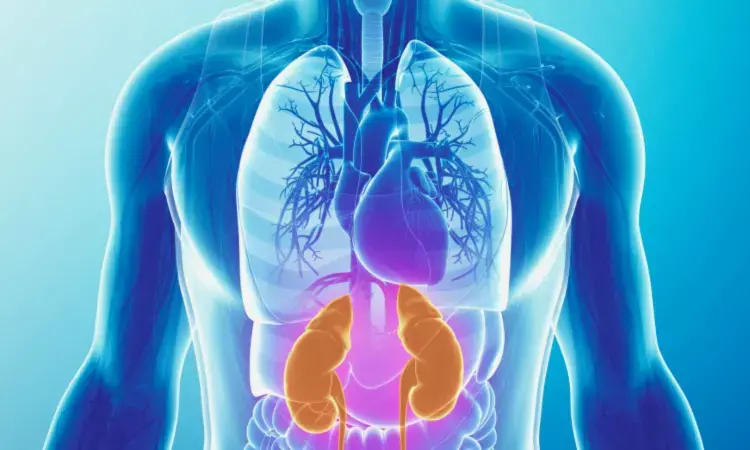- Home
- Medical news & Guidelines
- Anesthesiology
- Cardiology and CTVS
- Critical Care
- Dentistry
- Dermatology
- Diabetes and Endocrinology
- ENT
- Gastroenterology
- Medicine
- Nephrology
- Neurology
- Obstretics-Gynaecology
- Oncology
- Ophthalmology
- Orthopaedics
- Pediatrics-Neonatology
- Psychiatry
- Pulmonology
- Radiology
- Surgery
- Urology
- Laboratory Medicine
- Diet
- Nursing
- Paramedical
- Physiotherapy
- Health news
- Fact Check
- Bone Health Fact Check
- Brain Health Fact Check
- Cancer Related Fact Check
- Child Care Fact Check
- Dental and oral health fact check
- Diabetes and metabolic health fact check
- Diet and Nutrition Fact Check
- Eye and ENT Care Fact Check
- Fitness fact check
- Gut health fact check
- Heart health fact check
- Kidney health fact check
- Medical education fact check
- Men's health fact check
- Respiratory fact check
- Skin and hair care fact check
- Vaccine and Immunization fact check
- Women's health fact check
- AYUSH
- State News
- Andaman and Nicobar Islands
- Andhra Pradesh
- Arunachal Pradesh
- Assam
- Bihar
- Chandigarh
- Chattisgarh
- Dadra and Nagar Haveli
- Daman and Diu
- Delhi
- Goa
- Gujarat
- Haryana
- Himachal Pradesh
- Jammu & Kashmir
- Jharkhand
- Karnataka
- Kerala
- Ladakh
- Lakshadweep
- Madhya Pradesh
- Maharashtra
- Manipur
- Meghalaya
- Mizoram
- Nagaland
- Odisha
- Puducherry
- Punjab
- Rajasthan
- Sikkim
- Tamil Nadu
- Telangana
- Tripura
- Uttar Pradesh
- Uttrakhand
- West Bengal
- Medical Education
- Industry
TyG Indices May Predict Death Risk in Cardiovascular-Kidney-Metabolic Syndrome: Study Finds

China: A recent cohort study published in Cardiovascular Diabetology has shed light on the link between triglyceride-glucose (TyG) indices and the risk of all-cause and cardiovascular mortality in individuals with cardiovascular-kidney-metabolic (CKM) syndrome across stages 0 to 3.
In the study, the researchers observed a significant link between triglyceride-glucose-related indices and a higher risk of all-cause and cardiovascular mortality in individuals with CKM syndrome. TyG-waist circumference (HR: 1.50) showed a strong association with all-cause mortality, while TyG-waist-to-height ratio (HR: 1.85) was notably linked to cardiovascular mortality, especially in individuals with CKM syndrome stages 1 and 3.
The researchers note that CKM syndrome, characterized by interlinked metabolic, cardiovascular, and kidney disorders, is increasingly recognized as a critical determinant of long-term health. It generally begins with the interplay of insulin resistance (IR), excessive or dysfunctional obesity, and the resulting systemic inflammation and oxidative stress. The link between the triglyceride-glucose index, TyG-related indices—known for their ability to assess IR and obesity—and mortality risk in individuals with CKM syndrome remains unclear.
To fill this knowledge gap, Hongyan Dai, Department of Cardiology, Qingdao Municipal Hospital, Qingdao University, Qingdao, China, and colleagues analyzed data from 6,383 participants in the NHANES (2009–2018) to explore the link between TyG and TyG-related indices with all-cause and cardiovascular mortality in individuals with CKM syndrome stages 0–3. They developed the TyG index, TyG-waist-to-height ratio (TyG-WHtR), TyG-waist circumference (TyG-WC), and TyG-body mass index (TyG-BMI).
The researchers assessed mortality risks using Cox proportional hazards models, smooth curve fitting, and two-stage Cox models. Subgroup analyses and interaction tests were performed to determine variations across different demographics to aid early prevention of CKM syndrome.
The study led to the following findings:
- There was a strong link between TyG-related indices and all-cause and cardiovascular mortality, except for the TyG index, which did not significantly impact all-cause mortality.
- TyG-WC had the strongest association with all-cause mortality (HR: 1.50), followed by TyG-WHtR (HR: 1.45).
- TyG-WHtR showed the strongest link with cardiovascular mortality (HR: 1.85), followed by TyG-WC (HR: 1.83).
- There was a L-shaped association between TyG-WHtR, TyG-BMI, and all-cause mortality in CKM syndrome.
- TyG-WHtR, TyG-WC, and TyG-BMI had a stronger association with all-cause mortality in individuals with CKM syndrome stages 1 and 3.
"Our study highlights the link between TyG-related indices and the risk of death in individuals with CKM syndrome stages 0–3. Those in stages 1 and 3 should be especially cautious about changes in these indices, as they may indicate a higher risk," the researchers concluded.
Reference:
Zhang, P., Mo, D., Zeng, W. et al. Association between triglyceride-glucose related indices and all-cause and cardiovascular mortality among the population with cardiovascular-kidney-metabolic syndrome stage 0–3: a cohort study. Cardiovasc Diabetol 24, 92 (2025). https://doi.org/10.1186/s12933-025-02642-7
Dr Prem Aggarwal, (MD Medicine, DNB Medicine, DNB Cardiology) is a Cardiologist by profession and also the Co-founder and Chairman of Medical Dialogues. He focuses on news and perspectives about cardiology, and medicine related developments at Medical Dialogues. He can be reached out at drprem@medicaldialogues.in


